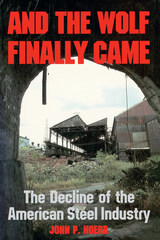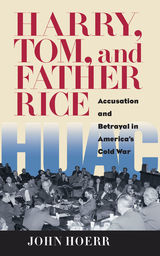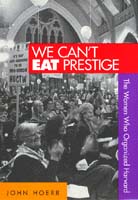
• Choice 1988 Outstanding Academic Book
• Named one of the Best Business Books of 1988 by USA Today
A veteran reporter of American labor analyzes the spectacular and tragic collapse of the steel industry in the 1980s. John Hoerr’s account of these events stretches from the industrywide barganing failures of 1982 to the crippling work stoppage at USX (U.S. Steel) in 1986-87. He interviewed scores of steelworkers, company managers at all levels, and union officials, and was present at many of the crucial events he describes. Using historical flashbacks to the origins of the steel industry, particularly in the Monongahela Valley of southwestern Pennsylvania, he shows how an obsolete and adversarial relationship between management and labor made it impossible for the industry to adapt to shattering changes in the global economy.

John Hoerr tells the story of three men—his uncle, Congressman Harry Davenport, union leader Tom Quinn, and Father Charles Owen Rice—whose lives became intertwined during the anti-Communist witch hunts of the McCarthy Era. The story helps illuminate one of the more repressive periods in American history, when thousands of Americans guilty only of enlisting in leftist causes were caught up in dragnets cast by overzealous Communist hunters on behalf of the House Un-American Activities Committee and other bodies. Much has been written about well-known cultural figures (the Hollywood Ten), and prominent writers (Arthur Miller and Lillian Hellman) who contended with HUAC. Hoerr tells of mostly ordinary Americans who were largely unknown at the time, but whose stories are nonetheless remarkable.
Writing from personal experience with the title characters, as well as archival research, Hoerr recreates the events of the 1949 HUAC hearings, where rigged testimony by a few workers cast suspicion on their union brothers. The results would echo through the years, causing people to lose jobs, marriages, and self-respect. Hoerr traces the paths followed by Harry, Tom, and Father Rice and relates their individual experiences to the great conflict between anti-Communist and Communist forces in the American labor movement, leading to the eventual demise of the CIO (Congress of Industrial Organizations).

This story explodes the popular belief that women white-collar workers tend to reject unionization and accept a passive role in the workplace. On the contrary, the women workers of Harvard University created a powerful and unique union--one that emphasizes their own values and priorities as working women and rejects unwanted aspects of traditional unionism.
The workers involved comprise Harvard's 3,600-member "support staff," which includes secretaries, library and laboratory assistants, dental hygienists, accounting clerks, and a myriad of other office workers who keep a great university functioning. Even at prestigious private universities like Harvard and Yale, these workers--mostly women--have had to put up with exploitive management policies that denied them respect and decent wages because they were women. But the women eventually rebelled, declaring that they could not live on "prestige" alone.
Encouraged by the women's movement of the early 1970's, a group of women workers (and a few men) began what would become a 15-year struggle to organize staff employees at Harvard. The women persisted in the face of patronizing and sexist attitudes of university administrators and leaders of their own national unions. Unconscionably long legal delays foiled their efforts. But they developed innovative organizing methods, which merged feminist values with demands for union representation and a means of influencing workplace decisions.
Out of adversity came an unorthodox form of unionism embodied in the Harvard Union of Clerical and Technical Workers (HUCTW). Its founding was marked by an absorbing human drama that pitted unknown workers, such as Kris Rondeau, a lab assistant who came to head the union, against famous educators such as Harvard President Derek Bok and a panoply of prestigious deans. Other characters caught up in the drama included Harvard's John T. Dunlop, the nation's foremost industrial relations scholar and former U.S. Secretary of Labor. The drama was played out in innumerable hearings before the National Labor Relations Board, in the streets of Cambridge, and on the walks of historic Harvard Yard, where union members marched and sang and employed new tactics like "ballooning," designed to communicate a message of joy and liberation rather than the traditional "hate-the-boss" hostility.
John Hoerr tells this story from the perspective of both Harvard administrators and union organizers. With unusual access to its meetings, leaders, and files, he examines the unique culture of a female-led union from the inside. Photographs add to the impact of this dramatic narrative.
postamble();READERS
Browse our collection.
PUBLISHERS
See BiblioVault's publisher services.
STUDENT SERVICES
Files for college accessibility offices.
UChicago Accessibility Resources
home | accessibility | search | about | contact us
BiblioVault ® 2001 - 2024
The University of Chicago Press









